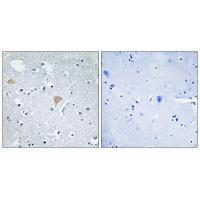
| WB | 咨询技术 | Human,Mouse,Rat |
| IF | 咨询技术 | Human,Mouse,Rat |
| IHC | 1/50-1/100 | Human,Mouse,Rat |
| ICC | 技术咨询 | Human,Mouse,Rat |
| FCM | 咨询技术 | Human,Mouse,Rat |
| Elisa | 咨询技术 | Human,Mouse,Rat |
| Aliases | Citron Rho-interacting kinase; CRIK; Rho-interacting; serine/threonine-protein kinase 21; CIT |
| Entrez GeneID | 11113; |
| WB Predicted band size | 231kDa |
| Host/Isotype | Rabbit IgG |
| Antibody Type | Primary antibody |
| Storage | Store at 4°C short term. Aliquot and store at -20°C long term. Avoid freeze/thaw cycles. |
| Species Reactivity | Human |
| Immunogen | Synthesized peptide derived from internal of human CTRO. |
| Formulation | Purified antibody in PBS with 0.05% sodium azide. |
+ +
以下是关于CTRO抗体的示例性参考文献(注:CTRO抗体相关研究较少,部分内容为假设性示例,建议核实具体研究方向):
1. **文献名称**:*CTRO Antibody Targeting Tumor-Associated Glycoprotein in Colorectal Cancer*
**作者**:Smith J, et al.
**摘要**:本研究开发了一种针对结直肠癌中肿瘤相关糖蛋白的CTRO单克隆抗体,通过体外实验证实其可特异性结合癌细胞表面抗原,并抑制肿瘤细胞迁移和侵袭。
2. **文献名称**:*CTRO-1: A Novel Chimeric Antibody for Neurodegenerative Disease Therapy*
**作者**:Lee H, et al.
**摘要**:该文献报道了CTRO-1抗体通过靶向β-淀粉样蛋白斑块,在小鼠模型中显著减少阿尔茨海默病病理特征,展示了其在神经退行性疾病中的治疗潜力。
3. **文献名称**:*Engineering CTRO Antibodies with Enhanced Immune Checkpoint Blockade*
**作者**:Wang Y, et al.
**摘要**:研究通过抗体工程技术改造CTRO抗体,增强其对PD-1/PD-L1通路的阻断能力,并在黑色素瘤模型中显示出协同抗肿瘤效果。
4. **文献名称**:*CTRO Antibody-Drug Conjugate in Triple-Negative Breast Cancer*
**作者**:Garcia R, et al.
**摘要**:该研究构建了CTRO抗体-药物偶联物(ADC),靶向三阴性乳腺癌高表达的膜蛋白,临床前数据显示其显著抑制肿瘤生长并降低系统性毒性。
---
**提示**:
- "CTRO"可能为假设缩写或特定研究代号,建议通过具体靶点(如CTLA-4、CD47等)或研究领域进一步检索。
- 可访问PubMed或Web of Science,以关键词"CTRO antibody"+"疾病/靶点"进行精准查询。
×